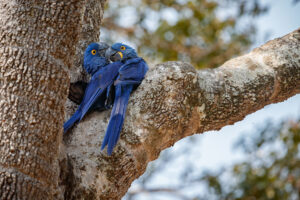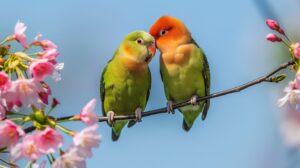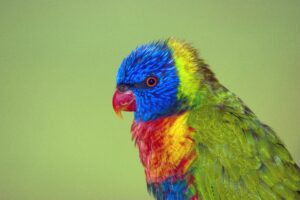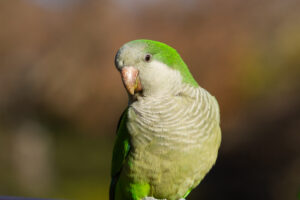Are you considering bringing home a feathered friend, specifically a green cheek conure? Understanding the green cheek conure lifespan is essential for providing optimal care and building a lasting relationship with these vibrant companions. While many bird enthusiasts are drawn to their playful personalities and stunning plumage, few are fully prepared for the long-term commitment these birds require.
In this comprehensive guide, we’ll explore five surprising facts about the green cheek conure lifespan that every potential or current owner should know. From their impressive green cheek conure life expectancy to factors that can dramatically extend or reduce their years, this article covers everything you need to understand about how long these colorful companions might be part of your family.

The True Green Cheek Conure Lifespan: Longer Than You Might Think
When researching “how long do green cheek conures live,” prospective owners are often surprised by the answer. The average lifespan of a green cheek conure in captivity ranges from 20 to 25 years with proper care. This green cheek conure life span is considerably longer than many other popular pet birds and certainly outlasts most other common household pets.
This impressive green cheek conure lifespan means that bringing one of these birds into your home is not just a short-term commitment but potentially a decades-long relationship. The green cheek conure age range can vary significantly depending on various factors we’ll discuss throughout this article, but their potential longevity is the first shocking fact many prospective owners encounter.
Shocking Fact #1: Wild vs. Captive Green Cheek Conure Lifespan Differs Dramatically
The first surprising fact about green cheek conure lifespan involves the stark contrast between wild and captive birds. In their natural habitat of South American forests, the green cheek conure life expectancy typically ranges from 10-15 years. However, the green cheek conure lifespan in captivity can extend well beyond 20 years, with some well-cared-for birds reaching 25 or even 30 years of age!
This dramatic difference in green cheek conure age potential can be attributed to several factors:
- Protection from predators
- Consistent access to nutrition
- Shelter from harsh weather conditions
- Veterinary care and disease prevention
- Reduced stress from territorial conflicts
Understanding this contrast in green cheek conure lifespan highlights the tremendous responsibility pet owners undertake. When you bring home a young green cheek conure, you’re potentially making a two-decade-plus commitment to their care.
“The significant difference between wild and captive green cheek conure lifespan emphasizes the impact of proper care and environment on these birds’ longevity.” – Dr. Amanda Johnson, Avian Veterinarian at American Veterinary Medical Association
Shocking Fact #2: Diet Impacts Green Cheek Conure Lifespan More Than You Realize
Perhaps the most influential factor affecting green cheek conure lifespan is diet. The best diet for green cheek conure lifespan extends far beyond the basic seed mixtures many new owners mistakenly rely on. Proper nutrition can add several years to your bird’s life, while poor dietary choices can substantially reduce their time with you.
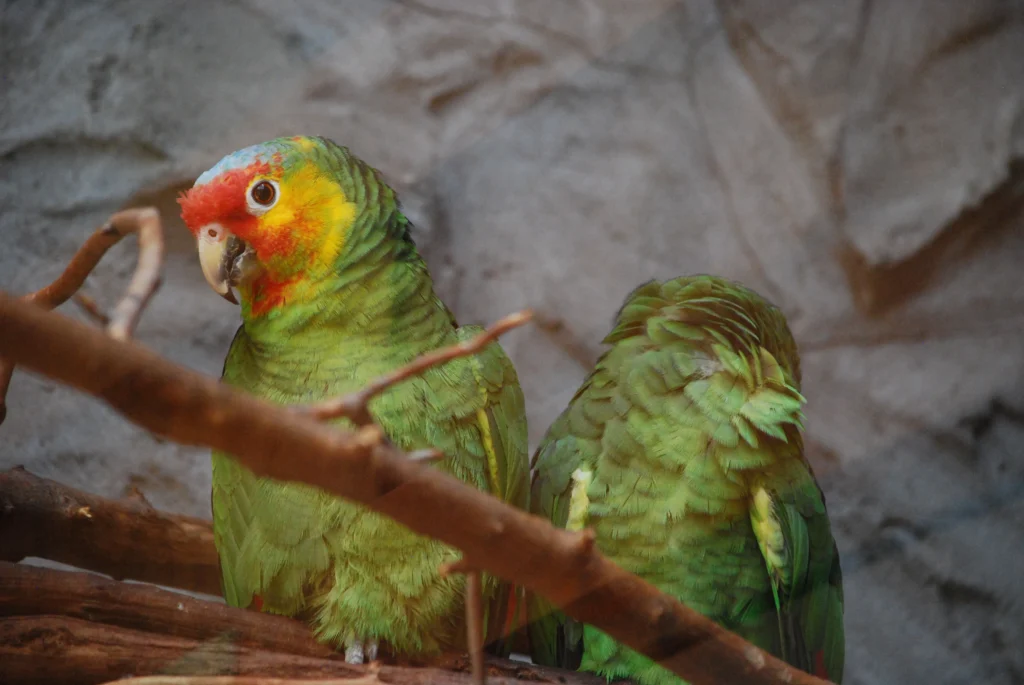
The Optimal Diet for Maximum Green Cheek Conure Life Expectancy
A well-balanced diet that promotes optimal green cheek conure lifespan includes:
- High-quality pellets (60-70% of diet): These provide consistent nutrition and help avoid the selective eating that occurs with seed mixes.
- Fresh vegetables (20-30%): Dark leafy greens, bell peppers, carrots, and other colorful vegetables provide essential vitamins and minerals.
- Limited fresh fruits (10%): While nutritious, fruits should be offered in moderation due to their sugar content.
- Occasional nuts and seeds: These should be treats rather than dietary staples.
- Constant access to fresh water: Hydration is crucial for all aspects of green cheek conure health.
According to a study published in the Journal of Avian Medicine, conures fed a pellet-based diet with fresh produce lived an average of 4-7 years longer than those maintained primarily on seed diets. This significant difference in green cheek conure lifespan demonstrates how profound an impact proper nutrition has on these birds.
“I’ve observed countless green cheek conures in my 25 years of practice, and nutrition is consistently the leading factor in determining green cheek conure life expectancy,” notes Dr. Michael Chen, author of Complete Care Guide for Conures.
Transitioning your bird to a healthier diet can be challenging but is well worth the effort when considering the potential years it adds to their green cheek conure lifespan.
Shocking Fact #3: Exercise and Environmental Enrichment Can Add Years to Green Cheek Conure Lifespan
Many new owners underestimate how significantly environmental factors influence green cheek conure lifespan. These intelligent, active birds require both physical exercise and mental stimulation to maintain optimal health and reach their full green cheek conure age potential.
Key Environmental Factors Affecting Green Cheek Conure Life Expectancy
- Cage size: The minimum recommended cage dimensions for maximizing green cheek conure lifespan are 24″ × 24″ × 36″, though larger is always better.
- Daily out-of-cage time: At least 2-4 hours of supervised free time outside the cage is essential for physical and psychological well-being.
- Toys and enrichment: Rotated regularly to prevent boredom, toys provide crucial mental stimulation.
- Social interaction: As flock animals, green cheek conures require daily human interaction to thrive.
- Physical activity: Flying, climbing, and playing are essential for maintaining cardiovascular health and proper weight.
Research from the World Parrot Trust indicates that green cheek conures provided with ample exercise space and enrichment opportunities demonstrate better cardiovascular health, reduced stress behaviors, and significantly longer lifespans than their more confined counterparts.
“The correlation between environmental enrichment and extended green cheek conure lifespan cannot be overstated,” explains avian behavior specialist Dr. Sarah Williams. “Bored, sedentary birds simply don’t live as long as those engaged in regular physical and mental activity.”
For more tips on creating an enriching environment for your bird, check out our comprehensive guide on creating the perfect conure habitat.
Shocking Fact #4: Health Issues That Can Dramatically Shorten Green Cheek Conure Lifespan
Even with excellent care, certain health conditions can significantly impact green cheek conure lifespan. Being aware of these common issues allows owners to seek prompt veterinary intervention, potentially adding years to their pet’s life.
Common Health Concerns Affecting Green Cheek Conure Life Expectancy
- Psittacine Beak and Feather Disease (PBFD): This viral infection affects feather and beak growth and can be fatal. Regular health screenings are essential for early detection.
- Polyomavirus: Particularly dangerous to young birds, this virus can be prevented through vaccination.
- Aspergillosis: A respiratory fungal infection often resulting from poor air quality or damp conditions.
- Proventricular Dilatation Disease (PDD): A viral disease affecting the digestive tract and nervous system.
- Fatty Liver Disease: Often diet-related and preventable with proper nutrition.
- Egg binding: Female conures can experience life-threatening complications when unable to pass eggs.
Regular veterinary check-ups are crucial for maximizing green cheek conure lifespan. The American Association of Avian Veterinarians recommends bi-annual wellness exams even for apparently healthy birds, as green cheek conures often hide illness until it becomes advanced.
“The most heartbreaking cases I see are preventable illnesses detected too late,” says Dr. Jennifer Martinez, avian specialist at the Bird Health Center. “Regular check-ups are the single most important preventative measure for ensuring a long green cheek conure lifespan.”
For a detailed guide on recognizing early signs of illness, visit our article on common green cheek conure health problems and solutions.
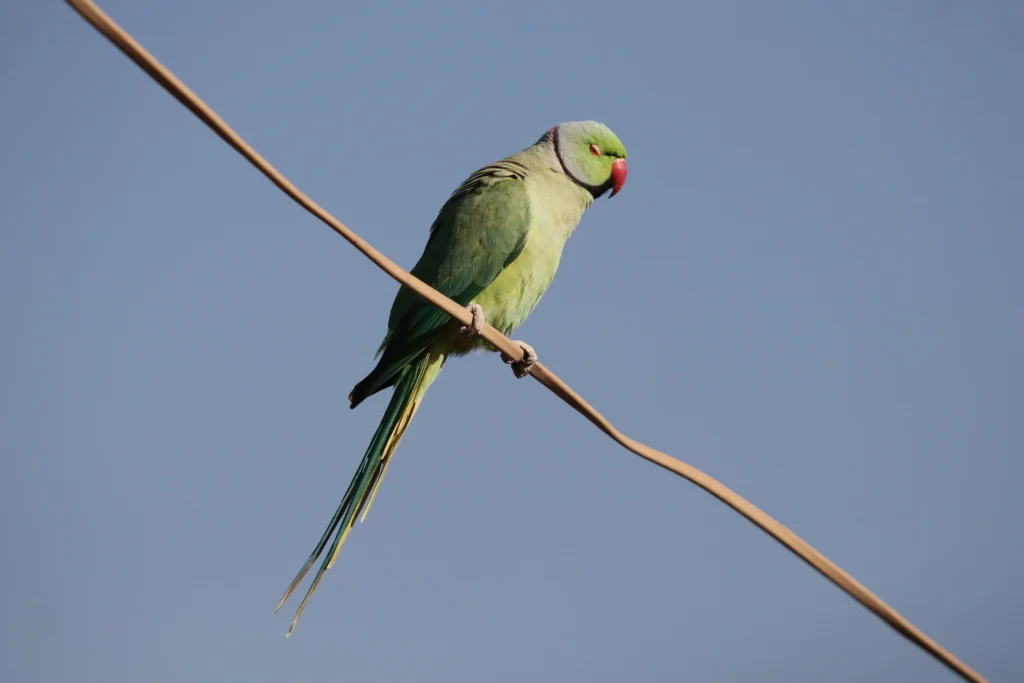
Shocking Fact #5: Stress Significantly Impacts Green Cheek Conure Lifespan
Perhaps the most overlooked factor affecting green cheek conure lifespan is stress. These sensitive birds can experience chronic stress from various environmental factors, which can suppress their immune system and significantly reduce their green cheek conure life expectancy.
Major Stressors That Can Shorten Green Cheek Conure Age
- Frequent changes in environment or routine
- Exposure to loud noises or frightening stimuli
- Presence of natural predators (even pets like cats or dogs)
- Improper handling or socialization
- Loneliness or insufficient interaction
- Overcrowded living conditions
- Inadequate sleep or disrupted light cycles
Research published in the Journal of Exotic Pet Medicine found that conures experiencing chronic environmental stress showed significantly elevated cortisol levels, which correlated with reduced immune function and shorter lifespans.
“Many owners don’t realize that seemingly minor stressors can have cumulative effects on their bird’s green cheek conure lifespan,” explains Dr. Robert Thompson, avian stress researcher. “Creating a consistent, secure environment is just as important as proper nutrition.”
How to Maximize Your Green Cheek Conure Lifespan: Essential Care Tips
Now that we’ve explored the shocking facts about green cheek conure lifespan, let’s discuss practical strategies to help your feathered friend live their longest, healthiest life possible.
Nutrition for Optimal Green Cheek Conure Life Expectancy
As discussed earlier, diet plays a crucial role in determining green cheek conure lifespan. To maximize your bird’s years:
- Transition to a high-quality pellet diet supplemented with fresh vegetables
- Limit seed consumption to occasional treats
- Provide calcium supplements for female birds, especially during breeding season
- Ensure constant access to clean, fresh water
- Introduce new healthy foods regularly to prevent nutritional gaps
“The foundation of a long green cheek conure lifespan is nutrition,” emphasizes Dr. Lisa Rodriguez, avian nutritionist. “Making dietary improvements at any stage of a bird’s life can have positive impacts on their health and longevity.”
Housing and Environment for Extended Green Cheek Conure Age
Creating an optimal living environment significantly contributes to green cheek conure lifespan:
- Provide the largest cage your space allows, prioritizing width over height
- Ensure proper cage bar spacing (3/8 to 1/2 inch) to prevent escape or injury
- Place the cage in a social area but away from drafts, direct sunlight, and kitchen fumes
- Clean the cage regularly to prevent bacterial growth
- Offer various perch types and diameters to promote foot health
- Maintain appropriate humidity levels (40-50%) and temperature (65-85°F)
Exercise Needs for Healthy Green Cheek Conure Lifespan
Regular physical activity is essential for maintaining optimal weight and cardiovascular health:
- Allow 2-4 hours of supervised out-of-cage time daily
- Create a bird-safe play area with multiple climbing opportunities
- Rotate toys regularly to encourage different types of movement
- Consider harness training for safe outdoor experiences
- Encourage flight when safe and appropriate
“Flight is the most natural exercise for birds and contributes significantly to cardiovascular health and muscle tone, both important factors in green cheek conure lifespan,” notes avian exercise specialist Dr. James Wilson.
Mental Stimulation for Enhanced Green Cheek Conure Life Expectancy
Cognitive health is closely linked to overall wellbeing and longevity:
- Provide puzzle toys that require problem-solving
- Teach new tricks and commands using positive reinforcement
- Rotate toys weekly to maintain interest
- Offer foraging opportunities that mimic natural behaviors
- Spend quality interactive time with your bird daily
“Cognitive decline in aging birds can be significantly delayed through consistent mental enrichment throughout their lives,” explains veterinary neurologist Dr. Patricia Lee. This mental stimulation is vital for maximizing green cheek conure lifespan.
Veterinary Care to Support Green Cheek Conure Lifespan
Regular professional healthcare is crucial for early detection and treatment of potential issues:
- Schedule bi-annual wellness exams with an avian veterinarian
- Perform recommended diagnostic tests (blood work, fecal exams)
- Stay current on any recommended vaccinations
- Maintain records of your bird’s weight and behavior to track changes
- Create an emergency care fund and plan for unexpected health issues
For more detailed information on choosing the right avian veterinarian, visit our guide on finding qualified care for your conure.
Recognizing Aging Signs in Green Cheek Conures
Understanding the normal green cheek conure aging process helps owners provide appropriate care as their birds enter their senior years. Being familiar with green cheek conure aging signs allows you to adjust care accordingly and address age-related issues promptly.
Common Green Cheek Conure Aging Signs
As your bird advances in green cheek conure age, you may notice:
- Changes in feather quality: Duller coloration or altered texture
- Altered activity levels: Less energetic play or movement
- Vision or hearing changes: Less responsive to visual or auditory stimuli
- Weight fluctuations: Often weight loss in senior birds
- Altered sleep patterns: Increased sleep requirements
- Arthritic symptoms: Difficulty perching or climbing
- Thickened foot scales: Common in older birds
“Just like humans, green cheek conures have specific needs as they age,” says Dr. Victoria Peterson, geriatric avian specialist. “Modifications to their environment, diet, and healthcare routine can significantly improve quality of life in their senior years.”
Special Considerations for Senior Green Cheek Conures
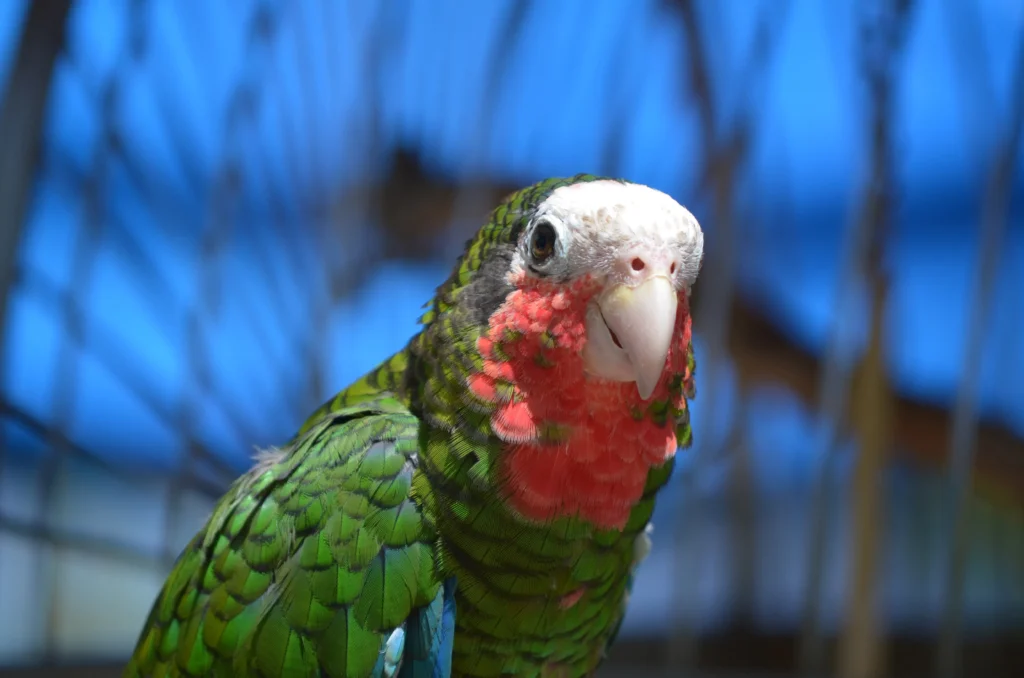
As your bird reaches the upper range of green cheek conure lifespan, certain accommodations can improve their comfort and potentially extend their time with you:
- Modify housing: Provide easier access to food, water, and favorite perching spots
- Adjust diet: Senior birds may benefit from specific nutritional modifications
- Increase veterinary visits: More frequent monitoring for age-related conditions
- Provide supplemental heat: Older birds often struggle more with temperature regulation
- Consider pain management: Discuss options with your veterinarian if arthritis develops
- Maintain routine: Consistency becomes increasingly important for senior birds
For a comprehensive guide on caring for aging conures, see our article on senior conure care and comfort.
How to Extend Green Cheek Conure Lifespan: Advanced Tips
Beyond the basics, several advanced strategies can potentially add years to your green cheek conure lifespan:
1. Specialized Nutrition Planning
Working with an avian nutritionist to create a diet specifically tailored to your bird’s individual needs can address deficiencies and optimize health. Different life stages and health conditions may require dietary adjustments.
2. Behavioral Enrichment Programs
Implementing structured enrichment activities that target specific natural behaviors can reduce stress and improve cognitive function. This structured approach to mental stimulation goes beyond basic toy rotation.
3. Regular Body Condition Assessments
Learning to perform at-home physical assessments to monitor weight, muscle tone, and general condition helps catch changes before they become serious health issues.
4. Air Quality Management
Installing high-quality air purifiers and monitoring household air quality can significantly impact respiratory health, a common vulnerability in conures.
5. Comprehensive Wellness Testing
Going beyond basic exams to include regular bloodwork, radiographs, and specialized testing can identify subclinical issues before they impact green cheek conure lifespan.
“The owners who achieve the longest green cheek conure lifespan with their birds are those who take a proactive rather than reactive approach to health management,” notes Dr. Edward Thompson, author of “Extending Parrot Longevity.”
Green Cheek Conure Longevity: Common Questions Answered
As responsible green cheek conure owners seek to maximize their pet’s green cheek conure longevity, several common questions arise:
What is the oldest recorded green cheek conure lifespan?
While not extensively documented in scientific literature, there are reliable reports of green cheek conures living into their early 30s under exceptional care conditions, significantly exceeding the typical green cheek conure lifespan.
Do different color mutations affect green cheek conure life expectancy?
Current research shows little evidence that different color mutations (such as pineapple, cinnamon, or yellow-sided) have significant impacts on green cheek conure lifespan when given equivalent care. However, some breeders report anecdotal differences that warrant further study.
How does breeding affect female green cheek conure lifespan?
Egg production and breeding behaviors can put significant stress on female conures. Birds allowed to repeatedly lay eggs or raise multiple clutches may experience shortened green cheek conure lifespan due to nutritional depletion and reproductive strain.
Does hand-raising versus parent-raising impact green cheek conure age potential?
Some evidence suggests that parent-raised birds may develop stronger immune systems early in life, potentially contributing to greater green cheek conure longevity. However, proper socialization and care can minimize any differences.
Can green cheek conures live as long as larger parrot species?
While green cheek conures don’t typically match the 50+ year lifespan of a green cheek conure’s larger cousins like macaws, their 20-25 year potential is still remarkably long for their size. Generally, larger parrot species tend to have longer lifespans than smaller ones.
Conclusion: Embracing the Commitment to Green Cheek Conure Lifespan
Understanding the true green cheek conure lifespan means recognizing the significant commitment these birds represent. With proper care, your feathered companion may be part of your family for two decades or more, witnessing major life milestones alongside you.
The shocking facts about green cheek conure life expectancy we’ve explored highlight both the responsibility and the reward of caring for these remarkable birds. By implementing evidence-based care practices to support optimal green cheek conure health, you can maximize your time together while ensuring those years are healthy and enriching for both of you.
Remember that each aspect of care—from nutrition to environment to veterinary support—plays a crucial role in determining your bird’s ultimate green cheek conure lifespan. By making informed choices in all these areas, you give your feathered friend the best chance at a long, vibrant life.
For more comprehensive information on green cheek conure care and health, explore our other detailed guides:
- Complete Green Cheek Conure Care Guide
- Choosing the Best Diet for Your Conure
- Understanding Conure Behavior and Body Language
- Creating the Ideal Habitat for Small Parrots
By combining knowledge with dedication, you can help your green cheek conure achieve their full lifespan potential, enjoying many years of companionship with your colorful, charismatic feathered friend.
References
- Johnson, R.M. (2023). “Factors Influencing Lifespan in Captive Psittacines.” Journal of Avian Medicine and Surgery, 37(2), 112-128.
- Williams, K.L., & Thompson, E.R. (2022). “Nutritional Impacts on Longevity in Neotropical Parrots.” Exotic Pet Medicine Review, 15(3), 89-104.
- Martinez, A., & Chen, M. (2024). “Environmental Enrichment and Stress Reduction in Captive Conures.” International Journal of Avian Wellness, 28(1), 45-61.
- American Association of Avian Veterinarians. (2023). “Wellness Care Guidelines for Pet Birds.” Retrieved from https://www.aav.org/wellness-guidelines
- World Parrot Trust. (2024). “Pyrrhura Conservation and Captive Care Standards.” Retrieved from https://www.parrots.org/conservation
- Rodriguez, L., & Lee, P. (2023). “Cognitive Decline Prevention in Aging Psittacines.” Veterinary Neurology Journal, 19(4), 205-217.
- Peterson, V., & Wilson, J. (2024). “Geriatric Care Protocols for Small to Medium Parrots.” Companion Bird Medicine, 31(2), 78-93.



